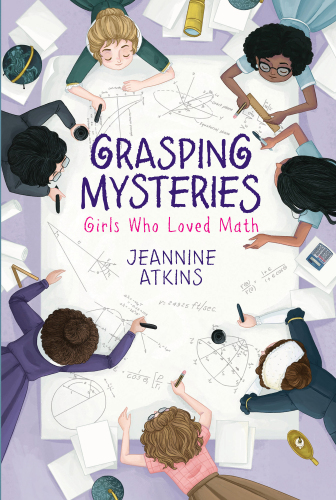
Grasping Mysteries
Girls Who Loved Math
فرمت کتاب
ebook
تاریخ انتشار
2020
Lexile Score
960
Reading Level
5-6
نویسنده
Jeannine Atkinsشابک
9781534460706
کتاب های مرتبط
- اطلاعات
- نقد و بررسی
- دیدگاه کاربران
نقد و بررسی

May 1, 2020
This collective verse biography "honors women who used math to frame and solve problems, fix things, or understand the size of the universe." Atkins opens with German Caroline Herschel (1750-1848), the first woman to discover a comet, and closes with American Vera Rubin (1928-2016), an astronomer who proved the existence of dark matter. Throughout, she illustrates how each woman faced personal obstacles as well as gender bias but never allowed "insults or lack of faith to stop" her. Florence Nightingale (1820-1910) revolutionized the nursing profession through use of medical statistics, and Hertha Marks Ayrton (1854-1923) became the first female electrical engineer, registering 26 patents; both women were English. American geologist Marie Tharp (1920-2006) helped develop the first map of the entire ocean floor while her countrywoman mathematician Katherine Johnson (1918-2020) endured segregation as she calculated trajectories for NASA. At the U.S. Census Bureau, statistician Edna Lee Paisano (1948-2014) used math to "give everyone a fair chance." With the exception of African American Johnson and Nez Perce Paisano, the women profiled are white. Presented chronologically in engaging verse with a feminist tone, the text artfully weaves scientific data and history with imagined "dialogue and sensory detail based on what's known about the time, places, and questions" of these remarkable math mavens. A line drawing introduces each woman's biography, and the "Women Who Widened Horizons" section summarizes their achievements. Thoroughly researched, creatively presented, inspiring real-life role models for girls who love math. (author's note, selected bibliography) (Verse biography. 10-14)
COPYRIGHT(2020) Kirkus Reviews, ALL RIGHTS RESERVED.

June 1, 2020
Grades 5-8 In this companion book to Finding Wonders (2016), Atkins presents the lives of seven girls who excelled in mathematics and later, often after overcoming significant obstacles, made significant contributions in related fields. Caroline Herschel discovered a comet, and Vera Rubin provided evidence of dark matter in the universe. Inventor Hertha Ayrton became the first woman electrical engineer. Meticulous statistical records were key to Florence Nightingale's success in changing hospital care and Edna Lee Paisano's progress in gaining significantly greater representation for Native Americans in Census Bureau reports. Marie Tharp turned a mountain of data into maps of the Atlantic Ocean floor, while Katherine Johnson calculated trajectories to the moon. Written in free verse, the text is welcoming, informative, pithy, wry, very readable, and occasionally haunting: as Florence Nightingale carries her lantern through the hospital wards at night, soldiers reach out to touch the shadow she leaves behind. Still, doctors resentful of her authority refer to her not as the Lady with the Lamp but as the Lady with the Hammer. A heartening celebration of mathematically gifted women.(Reprinted with permission of Booklist, copyright 2020, American Library Association.)

























دیدگاه کاربران